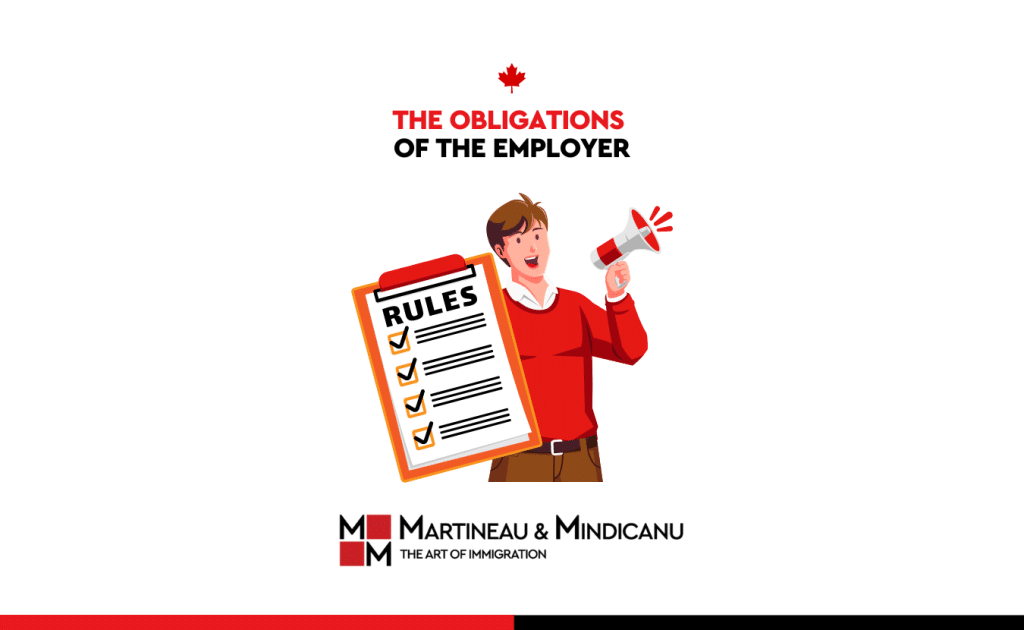In order to protect both foreign and local workers, Canadian employers must comply with several obligations towards the government and the workers they hire.

First and foremost, before a temporary foreign worker (TFW) can work in Canada, they must obtain legal authorization. As part of the Temporary Foreign Worker Program (TFWP), the process is initiated by the employer who must obtain a Labour Market Impact Assessment (LMIA). This document confirms that the position meets Canadian labour market standards (salary, working conditions, hiring process). An employment contract must not only be established but also respected as long as the work permit, LMIA and CAQ are valid and the candidate is employed.
What are the obligations of the employer?
To protect foreign and local workers, Canadian employers must comply with several obligations towards the government and the workers they hire. Here’s a comprehensive guide to understanding these responsibilities:
- About the LMIA
For a Temporary Foreign Worker (TFW) to work in Canada, the employer must obtain a validated Labour Market Impact Assessment (LMIA). This document confirms that the position meets Canadian labour market standards, especially in terms of salary and working conditions. In Quebec, the employer must also obtain a province-specific LMIA and a temporary selection request. The employment contract must be respected as long as the work permit, LMIA, and temporary selection request are valid.
- Housing and documents
The employer must generally ensure that the temporary foreign worker has access to suitable housing.
All documents related to the Temporary Foreign Worker Program (TFWP) must be kept for six years. The employer must immediately inform the relevant authorities of any changes or errors in an approved LMIA and any changes in the working conditions of foreign workers.
- Expenses to be covered by the Employer
- Round-trip flight ticket: At the employer’s expense for low-wage positions.
- Housing: Except for the agricultural sector, rent is the responsibility of the worker if the LMIA concerns a low-wage position. The employer must provide or assist the worker in finding affordable housing.
- Health insurance: Coverage during the first three months is the responsibility of the employer.
- Recruitment and LMIA fees: must be covered by the employer. The fees for the CAQ Quebec) and work permit may be paid by the worker.
- Compliance with Canadian Laws
The employer must comply with all Canadian employment laws, provincial labour standards, and human rights. Financial penalties and a ban from participating in the TFWP may be imposed for non-compliance.
- Controls and Sanctions
The government conducts random inspections and responds to complaints. Employers must provide all requested documentation to prove compliance. In case of non-compliance, financial penalties of up to $100,000 per violation may be imposed, as well as a ban on hiring foreign workers.
- Best Practices
- Integration: Assist the worker in understanding local procedures.
- Standard of Living: Consider including a suitcase in the airfare or paying for the work permit to facilitate integration.
- Corporate Culture: Encourage cultural exchanges and establish a mentoring system to facilitate the integration of newcomers.
How can non-compliance be detected?
The government conducts random checks on employers participating in the TFWP. During inspections, employers must provide all requested documentation to ensure compliance. Inspections can also be triggered by complaints, government suspicion of non-compliance, an employer’s history of non-compliance, or outbreaks of communicable diseases in the workplace.
What happens in case of non-compliance?
There are over 30 reasons for non-compliance. The same employer can be sanctioned for 1 or more of these reasons in the event of an inspection. Concrete examples include:
- Employer failing to provide requested documents to inspectors.
- Job not matching what was stated in the job offer, such as a cook primarily performing dishwasher duties.
- Employer not making sufficient efforts to ensure a violence-free workplace or prevent sexual harassment.
- Employer failing to provide foreign workers with information about their rights in Canada in their preferred official language on their first day of work or earlier.
- Employer not making enough efforts to provide foreign workers access to healthcare when injured or ill at work.
- Employer not ensuring that anyone involved in hiring the foreign worker does not charge any fees except for application processing fees. It cannot be emphasized enough that it is illegal to sell a job offer or “employer match” to a candidate.
- Employer failing to subscribe to private insurance covering urgent medical care for the foreign worker during periods when they were not covered by the applicable provincial health insurance scheme and paid the subscription fees.
If an inspection results in a sanction, the information will be made public. For more details, visit the list of non-compliant employers and the sanctions applied here.
In addition to legal obligations, there are also “moral” obligations or best practices. These small details will make life easier for your temporary foreign worker and will help them appreciate and respect their job and employer.
If you are unsure about your compliance, your immigration advisor (lawyer or regulated consultant) can guide you. Sometimes, voluntary disclosure to the Canadian government can prevent many sanctions.
Legal Notice
The content of this publication is general and does not pretend to be specific legal advice. For information on the application of Canadian immigration laws in your case, we invite you to schedule a personalized consultation.
Legal References
Preparing your LMIA for Quebec
